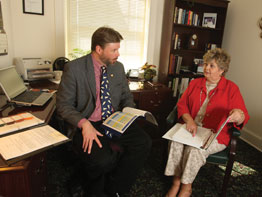The sun rises over the Chesapeake Bay, offering hopeful rays each morning to patients meditating on the lawn by the chapel at Father Martin’s Ashley.
A drug addiction treatment facility nestled away from the public in Havre de Grace, Ashley’s peaceful surroundings radiate with the promise of new life for its patients. For the past 25 years, as prescribed by its cofounders Father Joseph Martin, S.S., and Mae Abraham, it has sought to treat the whole person, including the spirit.
“We have a philosophy of treatment and a standard of care that focuses on the innate dignity of the human person,” said Ashley CEO Father Mark Hushen, O.S.F.S. “Everything we do reflects our belief in healing with dignity.”
Even the campus’ setting along the Chesapeake resonates with that belief, Father Hushen said. “The natural beauty of our campus is a very powerful healing agent for people,” he said. “The serenity of just being there with the bay and the way the sun rises – for many people, that’s the beginnings of their reconnecting with their spirit and with some kind of peace and serenity.”
This philosophy centered on human dignity is a direct descendent of the treatment Father Martin received 50 years ago at Guest House, a facility in Lake Orion, Mich., treating clergy suffering from addiction, Father Hushen explained.
It is the philosophy that inspired Father Martin, who is now in his 60th year of priesthood and his 50th year of sobriety, to speak to people around the country struggling with addiction. And it was these talks which inspired a lifelong friendship with Ms. Abraham, who listened and found her path to recovery, said Ashley director of marketing Lisa Bucklin Williams.
Ms. Abraham later wondered why the treatment Father Martin had received at Guest House was not available to the public. That led to the opening in 1983 of Father Martin’s Ashley, said Ms. Williams.
Now, 25 years later, Father Hushen, also in recovery, sees a great need for places like Ashley to help people heal from the disease of addiction.
Ms. Williams explained the traditional in-patient treatment prior to the development of centers like Ashley was harsh, lasting 60 days and involving a lockdown with “no phone calls, letters or visitation whatsoever.”
But according to Father Hushen, “In some ways, you might say that the proper treatment for alcoholism and drug addiction is soul therapy, and part of that is just loving people back to health.”
As such, every building on the Ashley campus houses staff, including the buildings where patients live and the chapel, which has offices below the sanctuary. “You’re really never away from someone who cares about you,” Ms. Williams said.
Ashley’s onsite medical staff is available 24 hours a day. Its counselors have been with the center for 10 years on average, said clinical director Chris Shea, emphasizing that the low turnover rate aids in the quality of treatment patients receive.
He stressed that patients are not entering a spa-like atmosphere where they can avoid dealing with their problems.
“If you want to live life as long as possible the best that you can, you need to change a lot of things,” Mr. Shea said, emphasizing the need to develop humility. “Learning a different way is what we promote here.”
“This place helps people get in touch with a higher power,” said Ms. Williams. “We don’t try to define that power for them. We just try to help them on their journey.”
She explained that Ashley’s 28-day educational and therapeutic program is non-denominational.
“We have that rootedness in spirituality,” said Father Hushen, “and we blend that with the art of therapy and the science of medicine and create an environment that really helps people to heal.”


